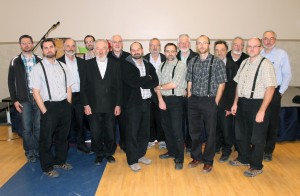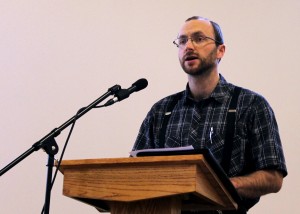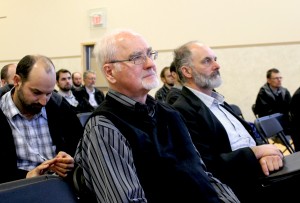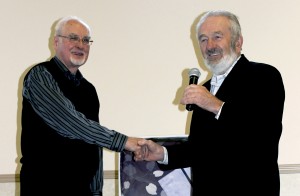John J. Friesen taught courses to hundreds of Hutterites
Hutterites in southern Manitoba honoured a Canadian Mennonite University professor recently for his contribution to their community.

The Hutterian Brethren Education Committee recognized Dr. John J. Friesen, Professor Emeritus of History and Theology, for his work teaching church and Hutterite history courses. Between 2000 and 2014, Friesen taught a number of courses to several hundred Hutterite teachers, pastors, and young people from across southern Manitoba, South Dakota, and Minnesota.
The presentation took place on Saturday, November 1 at the Acadia Hutterite Community, two hours west of Winnipeg near Carberry, MB.
The Hutterian Brethren originated as the Austrian branch of the Anabaptist movement of the 16th century. Absolute pacifism and community of goods are key practices for the Hutterites, who live in rural communities made up of 50 to 150 people.
To honour Friesen’s work, the Hutterites made a $10,000 donation in his name to help fund Marpeck Commons, the new library, learning commons, and bridge at CMU. The committee also commissioned Victor Kleinsasser of the Crystal Spring Community near Ste. Agathe, MB to create an artwork that will be displayed in the new space.
Nearly 20 colonies contributed to the donation.
During the presentation, Jesse Hofer noted that Hutterites have traditionally been suspicious of scholarship, thinking it might lead to the ruin of the church.

Hofer, a CMU graduate, teacher, and member of the Silverwinds Hutterite Community near Sperling, MB, said that what Hutterites have forgotten is that their 16th century ancestors valued education.
With Friesen’s help, the Hutterites have developed a better understanding of their heritage and the importance of educating themselves about their history.
“John (has) made words like ‘theology’ and ‘eschatology’ a little less scary for us, and I believe that will serve us well as we push into largely uncharted territory of higher learning,” Hofer said.
Friesen’s relationship with the Hutterites began with his English translation of Peter Riedemann’s Confession of Faith in 1999.
An elder, missionary, and writer born in Germany at the beginning of the 1500s, Riedemann is considered by some to be the second founder of the Hutterite brotherhood. He wrote the confession, titled in its original German as Rechenschaft unseres Glaubens geschrieben zu Gmunden im Land ob der Enns im Gefencknus, while imprisoned for his Anabaptist faith.
Before Friesen’s translation, the Rechenschaft was largely inaccessible to most Hutterites because of the archaic German of Riedemann’s original text, and because of the nearly five centuries separating modern Hutterites from Riedemann’s time.

As a result of Friesen’s translation and introduction, the Rechenschaft is now in nearly every Hutterite home and has given the Hutterites a deeper appreciation of their early history.
Friesen’s work on the translation led to the development of the courses he taught to Hutterites. Through the courses, Hofer said, Friesen has demonstrated that higher learning can and should be done in truth-seeking service to the church.
Hofer recalled something one of his professors told him while he was studying: “Jesse, if CMU has not made you a better Hutterite, we have failed you.”
What that professor meant, Hofer said, is that his studies at CMU should better equip him to understand his heritage and its relevance for today.
“John, I think it is fair to say that you have made us better Hutterites in that sense, and for that, we are in your debt,” Hofer said during the presentation.
Friesen was touched by the presentation, which he described as overwhelming.
“I just had a great time over these 14 years teaching these courses, and I did it because I loved it, and I loved becoming acquainted with you and (getting) to know you,” Friesen told the audience, which was made up of 150 German teachers, many of whom had taken one or more courses with him.

He added that he will no longer teach the classes because he is getting older and retiring from some of his commitments, but also because there are now a number of Hutterites who can do the job themselves.
“You have a fairly large pool of young people who are dedicated and committed communalists, who are committed to your heritage (and) who know your heritage, who are knowledgeable and who can continue the teaching,” Friesen said.
He went on to note that Hutterites have a strong, rich heritage that provides a witness to the world that needs to be heard.
“Communal living has a sound biblical base, and you have created communities in which each person can be valued and supported and nurtured,” Friesen said.
“In an individualistic world, you’re holding up a model of communalism that often is not understood, but people are curious and they want to know. I think you have something very important and valuable to continue to say to our society, not only in words, but by example.
Friesen concluded by thanking the Hutterites for the celebration and for giving him the opportunity to teach the courses.
“I have loved those sessions that we had and I will miss them,” he said. “Those were, for me, very good times.”
